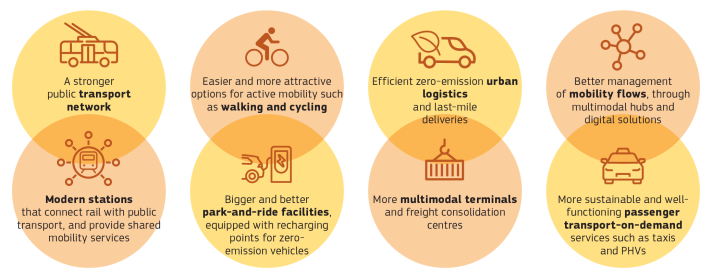Over 70% of EU citizens live in urban areas (cities, towns and suburbs) that generate 23% of all transport greenhouse gas emissions. To help the European Union reduce greenhouse gas emissions (by at least 55% by 2030 and by 90% by 2050), the Urban Mobility Framework initiative proposes measures to encourage EU Member States to develop urban transport systems that are safe, accessible, inclusive, affordable, smart, resilient, and emission-free.
The EU Urban Mobility Framework strives to improve the quality of life of the EU urban population by addressing urban mobility challenges (such as air pollution, congestion, accessibility, urban road safety, growth of e-commerce, etc.) and by increasing the share of sustainable transport modes (in particular public transport and active mobility) as well as zero-emission urban logistics, last mile deliveries and urban fleets (taxis and ride-hailing services).
It prioritises the construction and modernisation of multimodal hubs, as well as new digital solutions and services. It promotes a coherent and integrated approach to urban mobility planning while mapping out funding options for local and regional authorities to implement priority actions. The initiative also draws lessons from the effect of COVID-19 on public transport to help with the transition to a climate-neutral economy and emission-free transport at the local level.

